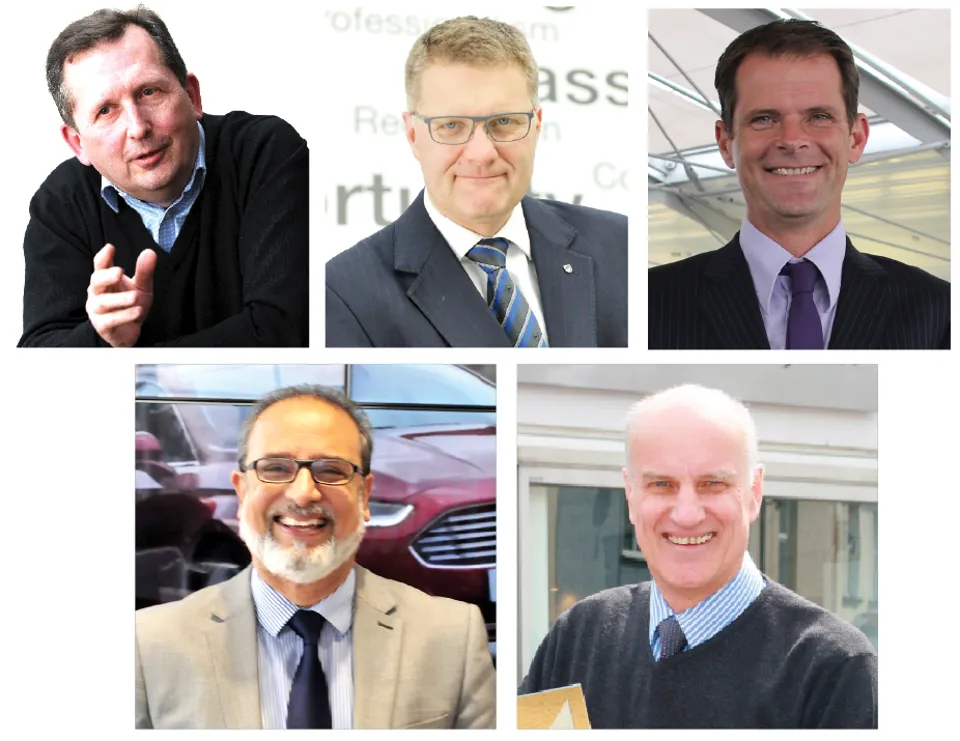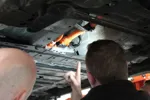The path to leading a dealer group may not always start with a burning desire to work in automotive retail (nearly all dealer bosses interviewed had other careers in mind). However, these interviews with leading figures in the industry show that the next directors of future AM100 groups can be found at all levels of the business.
Was it always your ambition to work in the motor retail industry?
Trevor Finn, chief executive, Pendragon: Not really. I used to mess around with motorbikes and so found a job as an apprentice mechanic locally, in Hull. The career advice given to me at the time was to, “get a trade; you’ll always be able to get a job”.
Robert Forrester, chief executive, Vertu Motors: No. I had originally planned for a career in academia. (Forrester is an Oxford geography graduate).
Darren Guiver, group deputy managing director, Group 1 Automotive: Absolutely. I was a petrolhead from an early age and seemed to have some sales skills at school, so marrying the two seemed obvious.
Nas Khan, managing director, Jennings Group: My father said I could be a doctor, accountant or engineer. My path to becoming an accountant was interrupted with a year out selling cars at Jennings.
Keith Kingham, managing director, Kinghams: I started as an automotive engineer abroad in Paris and Hamburg. I would always help my father in the workshop, but it wasn’t until the business took on a forecourt space and I started selling cars at 24 that I knew this would be the industry I would stay in. I loved it.
What are the key moments of progression during your career?

Trevor Finn
Chief executive, PendragonFirst job in auto retail: Apprentice mechanic
No of staff: 9,653 (2015)
No of dealerships: 210 (2016)

Robert Forrester
Chief executive, Vertu MotorsFirst job in auto retail: Finance director
No of staff: 4,491 (2016)
No of dealerships: 154 (2016)

Darren Guiver
Deputy managing director, Group 1 AutomotiveFirst job in auto retail: Sales executive
No of staff: 1,084 (2014)
No of dealerships: 42 (2016)

Nas Khan
Managing director, Jennings Motor GroupFirst job in auto retail: Sales Executive
No of staff: 410 (2014)
No of dealerships: 8 (2016)

Keith Kingham
Managing director, KinghamsFirst job in auto retail: Sales executive
No of staff: 16
No of dealerships: 2
Finn: I progressed in the BMW Hull dealership service team, to a dealer principal role. When our dealership was acquired, joining a large company with experienced people around me really helped me learn and offered progression opportunities.
Forrester: Entering the automotive retail industry as financial director of Reg Vardy in 2001, progressing to managing director in 2005 and then leaving the group to start Vertu in 2006.
Guiver: Making sales manager at Perry’s in North London at 23 was a proud moment and really set me on the path to go further. Working at HMG Holdings when they went into receivership also showed me what a team can still achieve in the face of adversity.
Khan: Each time I thought it was time for me to move on to my accountancy career, I’d be promoted. When I became group sales and marketing director, I really knew I was in this for the long term. I’ve been through three management buyouts, but the last one in 2012 was when I bought the whole group.
Kingham: I did the MSc in Strategic Automotive Dealership Management at Loughborough University in 2012 and I really enjoyed it. Introducing a profit-share scheme for everyone in the business was a good move in terms of reflecting how important I think it is to be transparent with everything you’re doing.
What formal or informal training have you taken on your journey to leading a business?
Finn: I studied business in night classes when I was an apprentice mechanic, but apart from that my experience is definitely on the job. Every day’s a school day. I learn a lot and it’s what keeps me motivated.
Forrester: I think training as a chartered accountant was pretty important on the business side. However, in terms of leadership skills there is a lot of personal development you do on your own.
Guiver: I have attended many training programmes and been tested once or twice. However, the course at Loughborough was a fantastic experience, not only in further education terms, but the balancing and discipline required to do this and still perform to a high level back at the dealership.
Khan: I’ve taken every training course offered to me, but I take what I learn and make it work for the way I like to approach things. I rebelled against the Arthur Daley stereotype when I started out in my career when I was told I’d have no success if I didn’t follow that formula. Sometimes it’s better to trust your own way of doing things.
Kingham: If I have a regret, it’s not doing something like the management degree earlier on in my career. I’m a great believer in training and it’s got to be continuous to stop staff development from hitting a plateau.
Are you still learning?
Finn: Our industry and business is always evolving.
Forrester: Too right. The last week I had off I read three cracking books which everyone in the business is now sick to death of.
Guiver: Without question, yes. I am constantly learning new things and listening for fresh ideas and input. The industry is moving at a pace and an open mind for change will ensure that our success continues for the longer term.
Khan: I am still learning every day and I ask other dealers what works for them in any area of the business. We want to learn from others and share what we’re doing. I’m not afraid of that.
Kingham: Having younger staff around you that have a natural affinity for the way new technology is taking off means I’m still learning from people within the business every day.
What advice would you give to an ambitious young manager looking to lead their own business or group one day?
Finn: Don’t move jobs chasing the next step. If you are good, you will get noticed if you are with the right company.
Forrester: Read up on any work by Tom Peters, John Maxwell and Robin Sharma. They are all worth it for starters.
Guiver: Be patient and your time will come. Bouncing from job to job for more money is not always the way to move forwards.
Khan: Honesty is so important and that goes for being honest with staff and customers, but also yourself. Don’t pretend to be an expert at something you’re not.
Kingham: You need to learn the basics. I wouldn’t ask someone to do something I wouldn’t do myself. Don’t walk around with an arrogant attitude and don’t make people feel like a number. You need to understand people and what motivates them to become a leader.
What is the most important lesson you have learned?
Finn: Concentrate on the stuff that matters.
Forrester: You must lead with character and this means understanding that leadership is about serving rather than expecting people to serve you.
Guiver: Without the right team around me at all times, my success would not have been as it has. Ensuring that you go through the good and bad times, because we do have them, together in full unison and communicating openly at all times makes for a more successful environment.
Khan: Slow down and don’t take as much on. It takes time to build a business and you’ve got to plan ahead as far as you can and expect that you will need to be flexible and that the business will be vulnerable.
Kingham: You can’t get things right every time. I think this industry can promote big egos – the ability to apologise and say you got it wrong is a strength, not a weakness.














Login to comment
Comments
No comments have been made yet.